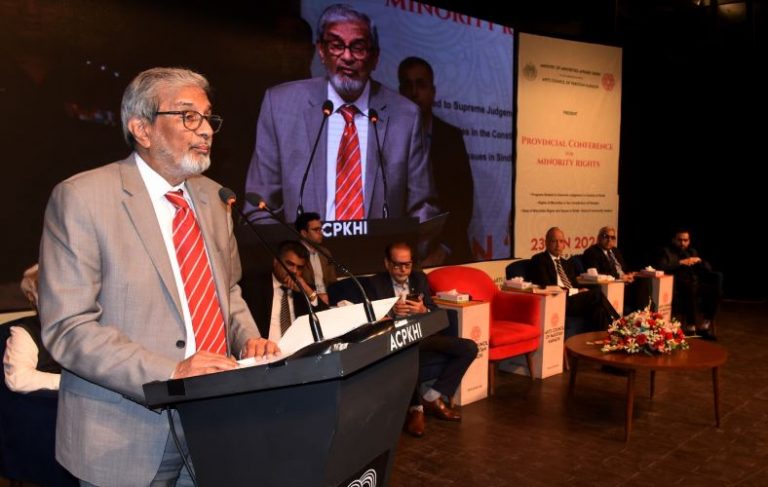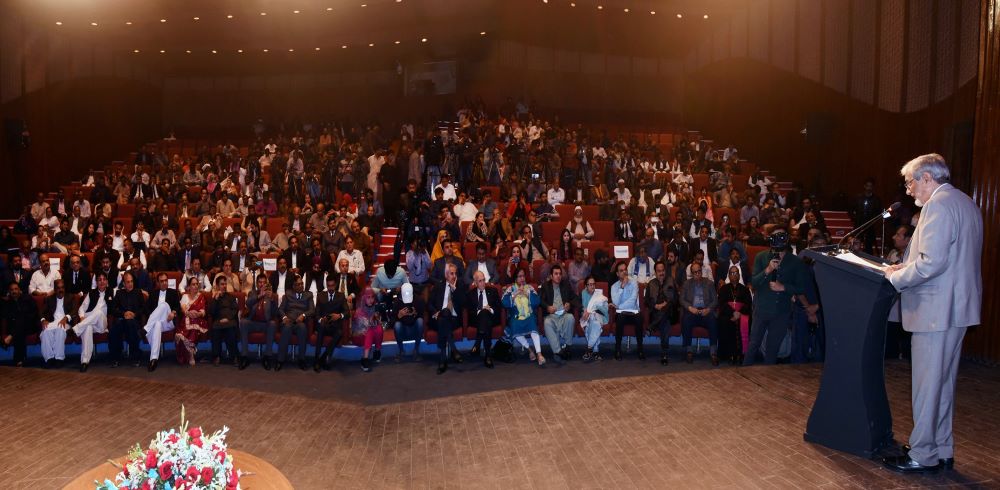
Fundamental rights and civil liberties are in jeopardy throughout the world as right-wing regimes attempt to further marginalize vulnerable communities – Sindh Chief Minister
Staff Report
Karachi, Sindh
caretaker Sindh Chief Minister Justice ® Maqbool Baqar speaking at a conference on Minority Rights said that no citizen should feel like a minority in their own country merely because they ascribe to a religion that is different from the one ascribed by a country’s majority.
The conference was organized by the Department for Minorities Affairs in collaboration with the Pakistan Arts Council at its auditorium on Tuesday.
“I believe that weaponizing laws meant to protect religion and patronizing radicalism has sown the seeds of bigotry and parochialism.”
Also read: Minority Communities are not treated well in Pakistan
CM that he has always believed that confronting uncomfortable truths and introspection is the key to a better future. He added that conferences like these also have another crucial function: they reiterate our commitment to upholding the rights of non-Muslim citizens, particularly their right to freely profess, practice, and propagate their faith.
 Today, fundamental rights and civil liberties are in jeopardy throughout the world as right-wing regimes attempt to further marginalize vulnerable communities, the CM said and added that the Indian Supreme Court validated the regime’s decision to build a temple on the site of the Babri mosque. “At the same time, despite pressure from radical elements, courts throughout Pakistan have done well to uphold religious liberties, often at the peril of violence from such radical groups,” he said.
Today, fundamental rights and civil liberties are in jeopardy throughout the world as right-wing regimes attempt to further marginalize vulnerable communities, the CM said and added that the Indian Supreme Court validated the regime’s decision to build a temple on the site of the Babri mosque. “At the same time, despite pressure from radical elements, courts throughout Pakistan have done well to uphold religious liberties, often at the peril of violence from such radical groups,” he said.
Justice Baqar said that in 2014, the Supreme Court took Suo motu cognizance of a horrific attack on a church in Peshawar. While laying down clear directions for the protection of religious sites, the Supreme Court held that “We are all members of one race of humans with common challenges, and we cannot confront these challenges without forging a common alliance. This paradigm shift in the world around us can be achieved at the international and domestic levels only by discouraging sectarian, racial and ethnic biases which are violative of shared values and fundamental rights, and by the promotion of and strict compliance with these values and rights.”
Also read: Political Promises vs. Reality: Insecurity for Minorities in Pakistan
The CM said that in more recent years, we have seen two more progressive judgments from the Supreme Court. Quoting Tahir Naqash’s case, he said that the Supreme Court acknowledged the rights of Ahmedis to practice and propagate their faith. Similarly, in Salamat Mansha’s case, the Supreme Court granted bail to a person accused of offences against religion.
Justice Maqbool Baqar said that the Supreme Court in Salamat Mansha’s case also highlighted how such allegations were often levelled to settle personal scores and the tendency of violent mops to pronounce judgments before the courts of law have declared a person guilty. “The significance of these judgments however exceeds their jurisprudential value,” he said and added that to the contrary, their significance was underscored by the Court refusing to be swayed by the prevailing winds of extremism. Furthermore, judgments like these are also significant in assuring citizens that their rights do not rest on tenuous footings.
CM said that we have often failed to protect non-Muslim citizens. “I consciously choose not to use the word minority because I believe no citizen should feel like a minority in their own country merely because they ascribe to a religion that is different from the one ascribed by a country’s majority,” and added that weaponizing laws meant to protect religion and patronizing radicalism has sown the seeds of bigotry and parochialism.
Also read: Pakistan’s Forgotten Dalit Minority
Justice Baqar said that unfortunately, extremism and bigotry have seeped across large segments of our population. He said that just as the State’s active role in patronizing radical groups has contributed to extremism, concerted efforts towards eliminating such groups and forging alliances with progressives would allow us to reverse the tide of violent extremism.
The interim CM said that as a signatory to international conventions such as the ICCPR, we must take concrete steps towards broadening the frontiers of religious freedom. “The journey ahead may seem arduous, but all monumental journeys begin with a single step,” he said and added that we must work for a pluralistic, democratic, and progressive Pakistan – a Pakistan where none of us is a minority, a Pakistan where our religious beliefs do not inhibit the opportunities we get.
“I believe without pluralism and diversity, peace and prosperity shall elude us,” the CM concluded.
_____________________